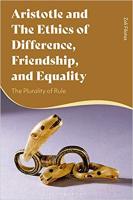
Bloomsbury (2023) p/b 216pp £28.99 (ISBN 9781350259935)
F. begins with a clear exposition of Aristotle’s theory of rule, which he calls ‘rule pluralism’: rule comes in many different kinds or forms (εἰδή). Examples given in Politics 1 include kingly rule, πόλις (polis) rule, managing the household, being a master of slaves, ruling your wife, ruling children. They require different skills. Moreover hierarchical domestic rule (οἰκονομική) must be kept distinct from political rule (πολιτική). Furthermore any combination of people form a hierarchical structure. Teachers rule over their pupils, doctors over their patients and so forth. The central books of Politics focus on πόλις rule, in which free citizens share in deliberation and decision, each pursuing the common good. Ruling involves causing people to act by providing them with ends. One does this using reason and argument (λόγοι). There is an intermediate position between ruling and being ruled: in mature democracies people occupy this position when they vote in assemblies or serve on juries. Ideally, people should alternate between performing each of these three different roles. In Politics Aristotle appears to regard πόλις rule as the best, but in Nicomachean Ethics he treats autocratic rule by a benevolent king as the ideal.
But how does one person influence the conduct of another? Aristotle identifies three means, namely λόγος, πάθος and ἦθος: πάθος refers to an emotional response by the listener, whereas ἦθος refers to the character of the speaker—if he was right last time, his views will probably be trusted this time. Persuasion through emotion is in the listener; persuasion through character is in the speaker; persuasion through λόγος is in the argument itself (p. 57). This is linked with Aristotle’s understanding of psychology, as explained in Nicomachean Ethics: the human soul has a rational part, which responds to reason, and another part (ἄλογον), which does not. Deliberation involves interplay between these two parts of the mind. An individual can outsource deliberation by submitting to the judgement of another. The ruler causes the actions of the subordinate by providing him/her with a practical goal. There is also the faculty of imagination (φαντασία) which operates alongside rational activity.
In chapter 3 F. reviews Aristotle’s study of relationships, contained in Nicomachean Ethic VIII-IX and Eudemian Ethics VII. His word φιλία is a wider term than ‘friendship’: it includes relations with merchants and business partners, fleeting connections between teenagers and the love of mothers for babies and toddlers. All relationships are based on pleasure, utility and/or virtue. Most relationships involve a power structure in which one party ‘rules’ in the Aristotelian sense. A community (κοινωνία) is a group of people who share goals and work together to achieve them. The relationship between justice and friendship is complex but involves fair exchange. There are analogies between relationships within the household and relationships within a Greek city-state. Aristotle classifies the different types of ruling in both contexts: for example, kingship is benevolent whereas tyranny is exploitative. The same is true of the way a man may ‘rule’ his household.
Aristotle famously said that man is a ‘political animal’ i.e. one who lives in a πόλις. F.’s last two chapters focus on such rule, which Aristotle discusses at length in Politics books II to VIII. Πόλις rule (which is contrasted with despotic rule) is exercised over people who are similar in birth and free. Rule-by-turns or some other mechanism ensures that everyone has an opportunity to take part in civic affairs. In that sense, says Aristotle, all men are equal, but all men are not of equal merit. The assets of the community should be distributed according to merit, i.e. not equally. Hence justice involves proportionality. The same set of rules should be applied to everyone and there should be equality before the law (ἰσονομία).
One of the many problems in Aristotle’s writings is that he warmly approves of πόλις rule, but on occasions says that kingship and aristocracy are the best form of rule. The reconciliation is to be found in Politics VII 14: kingship is the ideal if the king and his ministers are vastly superior in wisdom and virtue, but in the ordinary world πόλις rule is the best form of government. That is the best way to achieve happiness (which is the ultimate goal as explained in Nicomachean Ethics). In πόλις rule government is shared between men who are free and broadly equal. Women and slaves are excluded from participation. Politics frequently stresses the importance of civic harmony. In Aristotle’s scheme, participation in πόλις rule meant holding one of the offices or magistracies in a Greek city state.
The above is very brief summary of an interesting and closely reasoned book. It is not an easy read, and it pre-supposes a general understanding of Greek philosophy. But Aristotle was the greatest polymath of the ancient world. He merits thoughtful study. This book is a valuable aid for anyone who is taking the time to study Aristotle seriously.
Rupert Jackson
